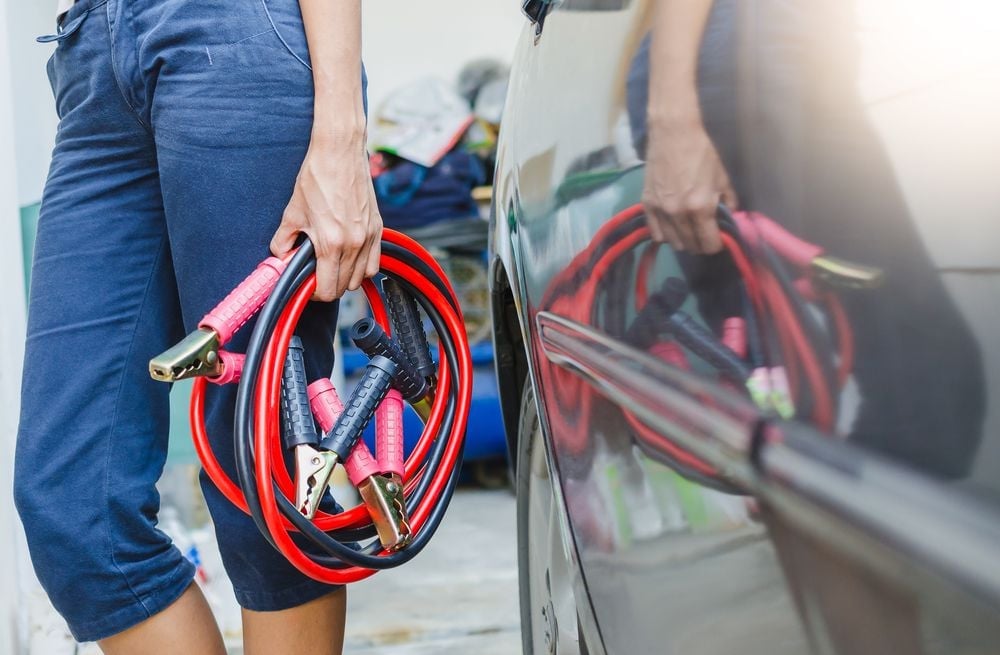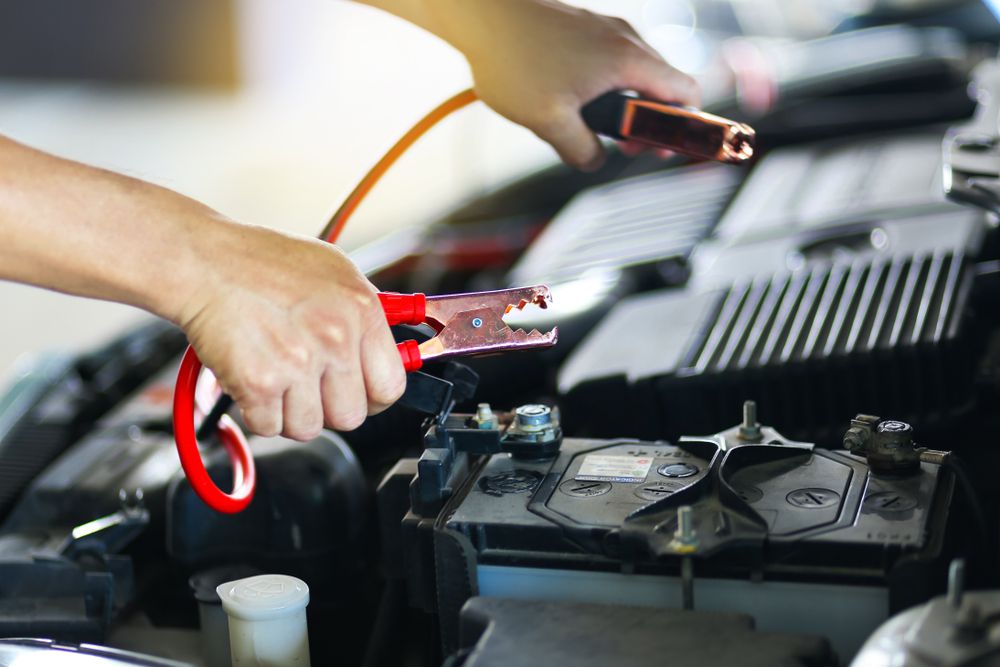
When your car's battery dies, jump-starting is often the only way to get
your wheels back on the road. But do cars come with jumper cables?
Cars don't come with jumper cables, despite being standard equipment in
your emergency roadside kit. Sometimes, you can ask your dealership for
a set of jumper cables as an extra. However, even luxury vehicles in
the USA don't include this essential kit.
Buy jumper cables to ensure you can kickstart a dead battery.
But we'll teach you about jumper cables, including how to use them, where
to buy them, and even what to do if you don't have any when your car
battery dies.
 Carrying a set of jumper cables.
Carrying a set of jumper cables.
Do New Cars Come with Jumper Cables?
Even modern cars use a battery to bring them to life.
So, if the battery dies, the car won't start.
Jumper cables supply power to a bad battery from a good one.
However, few cars include jumper cables in their standard packages.
Historically, only high-end Rolls-Royce and Bentley luxury vehicles came
with jumper cables in their accessories kit.
Lucky owners could also find wheel chocks, safety reflectors, and other
helpful accessories to ensure they could jump-start their vehicles while
out and about.
In today's world, finding vehicles that come with jumper cables is near-on
impossible — you'll need to ask for them before purchasing a new car.
With that in mind, you should never forget to buy your own set.
Can You Use Jumper Cables on New Cars?
Since new vehicles contain batteries, you can use jumper cables to
kickstart a dead car battery.
That said, you need to be careful.
These days, most cars are electronic, and you could cause significant
damage if you misuse jumper cables.
You should always establish a proper connection and find a set of jumper
cables that protect from voltage surges and reverse attachment.
What Cars Come with Jumper Cables?
To put it simply, no cars come with jumper cables today.
From the affordable Toyota Aygo to the typically out-of-reach Bentley
Flying Spur, you won't find a set of jumper cables included as standard —
although it's always worth checking with the manufacturer or dealership.
It's up to you to purchase your own set of jumper cables.
 Connecting a set of battery cables.
Connecting a set of battery cables.
How to Use Jumper Cables Correctly
Since misusing jumper cables can be dangerous, it's imperative to
understand how to use them correctly before diving in.
Here's
how to use jumper cables
like a pro:
-
Park the vehicle with the working battery in front of the car with the
dead battery and switch them off. You won't need to worry too much
about the vehicle's closeness if you have longer jumper cables.
-
Open both hoods and find the batteries. If they're covered, remove the
case to expose the battery posts.
-
Locate the positive and negative terminals. The former may be red, but
since that isn't always the case, look for the plus or minus signs
instead.
-
Remove any dirt from the battery posts.
-
Grab your jumper cables and connect one of the red clamps to the
positive terminal on the bad battery and the other side of the red
jumper cable to the positive post on the working battery.
-
Connect one of the black clamps to the negative post of the functioning
battery.
-
Connect the other end of the black cable to a bare metal surface (i.e.,
a screw or bolt) on the dead car's engine. This provides grounding for
the jump start.
-
Start the working vehicle's engine first, letting it idle for several
minutes.
-
Start the dead car's engine, also allowing it idle.
-
If the failing car starts without problems, disconnect the black clamp
from its engine before disconnecting it from the other vehicle.
-
Lastly, disconnect the red clamp from the good car's battery before
removing it from the formerly dead battery.
What Should You Do When Your Car Doesn't Have Jumper Cables?
It may seem like all hope is lost when you're sat on the road in a car with
a failed battery and can't find your jumper cables even after searching in
the side pockets, trunk, and under the seats.
But you have a few options at your disposal to reenergize your travels:
#1 Call a Tow Service
If you have roadside assistance, call them.
They'll almost always have their own set of cables onboard.
Although, you might have to wait a while for them to show up, depending on
your location.
#2 Battery Booster
Owning a battery pack can negate the need to ask anybody for help.
However, you must make sure your new battery pack is charged before you hit
the road so you can use it when the time arises.
#3 The Push-Start Method
If you have a manual vehicle, you can try the push-start method.
It can be a tricky maneuver to pull off, so it's best to educate yourself
on
how to conduct the push-start method
before attempting it.
#4 Call a Friend
If you aren't far from home, calling a friend or relative to see if they
can bring jumper cables and a working vehicle is a great, cost-effective
option.
#5 Ask a Stranger
If you don't have roadside assistance and your friend/relative is nowhere
to be seen, you can enlist the help of a stranger.
Nine times out of ten, people are willing to help and may have a battery
pack or jumper cables to get you out of the sticky situation.
Are Jumper Cables Obsolete?
Jumper cables have been the solution for kickstarting a dead battery for
over a century.
However, they require a working battery from another car to obtain power,
and the probability of misconnecting the battery terminals and causing
damage is relatively high.
Therefore, many drivers (and probably your auto repair shop) consider them
somewhat obsolete — most opt for the battery pack option instead.
Where to Buy Jumper Cables
We always recommend having jumper cables in your car for unprecedented
circumstances.
Luckily, they're relatively inexpensive, and you can purchase them from
almost any high street auto store or Amazon.
Conclusion
Hopefully, you're now fully clued up on the necessity of jumper cables, the
fact that cars don't typically come with them, and how many drivers opt for
a battery pack.
Remember, if you don't have jumper cables to hand, you can always call
roadside assistance, try the push-start method, enlist the help of a
stranger, or use a battery pack to get your wheels rolling.